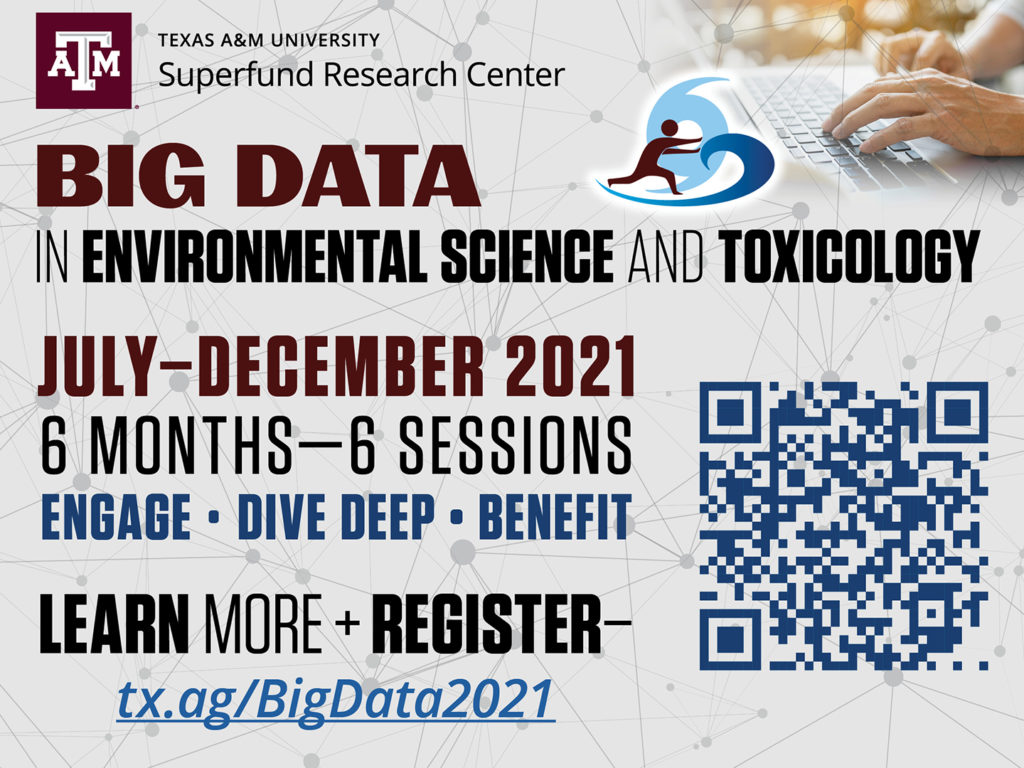Texas A&M Superfund’s Big Data Series Introduces Diverse Audience To Data Science

The Texas A&M Superfund Research Center’s “Big Data in Environmental Science and Toxicology” virtual learning series was held from July to December and consisted of six, two-hour interactive seminars led by data science experts.
The free training series offered 280 unique attendees the opportunity to learn from experts about available data, mechanisms for sharing scientific information, the “how and why” of data science, handling large datasets, and placing research data into “real-life” contexts.
Overall, this series offered a broad range of participants a unique opportunity for continuing education in a very important contemporary topic.
“Data Science is a somewhat mysterious topic to most biomedical scientists and professionals,” said Dr. Ivan Rusyn, director of the Texas A&M Superfund Research Center and professor at the College of Veterinary Medicine & Biomedical Sciences (CVMBS). “Our goal was to provide practical skills and tools to those who are not trained in statistics and bioinformatics; according to the feedback we received on each session and this series overall, this goal has been met and we plan to hold these events annually.”
Sessions were attended by trainees, researchers, faculty, and science administrators from both the United States and foreign academic institutions, private companies, and governments. Countries represented included Germany, Mexico, New Zealand, Puerto Rico, Russia, South Korea, Taiwan, Turkey, and the United Kingdom.
Topics covered during the sessions included the U.S. Environmental Protection Agency’s (EPA) chemicals dashboard; “New Approach Methodologies” for chemical safety assessments; using Microsoft Excel and the statistical programming environment R for viewing and manipulating data; estimating chemical exposures; and using online resources for predicting toxicity of new and existing chemicals.
Instructors included Antony Williams and Caroline Ring from the EPA; Ruchir Shah, Alex Sedykh, Vijay Gombar, and Austin Ross from the research and technology consulting company Sciome LLC; and researchers from several Superfund Research Program-funded universities, including Burcu Beykal from the University of Connecticut, Candice Brinkmeyer-Langford from Texas A&M University, and Fred Wright, Allison Dickey, and Dillon Lloyd from North Carolina State University.
Two sessions from the Big Data series will also be used in the Biomedical Data Science Online Training Program, a 12-part series hosted by the Texas A&M Institute of Data Science.
###
For more information about the Texas A&M College of Veterinary Medicine & Biomedical Sciences, please visit our website at vetmed.tamu.edu or join us on Facebook, Instagram, and Twitter.
Contact Information: Jennifer Gauntt, Director of VMBS Communications, Texas A&M College of Veterinary Medicine & Biomedical Sciences, jgauntt@cvm.tamu.edu, 979-862-4216


